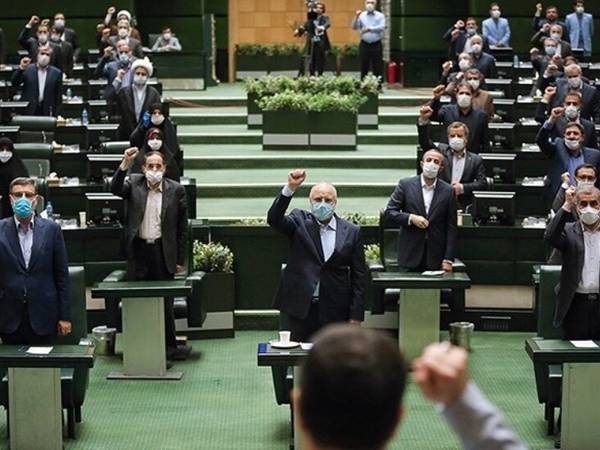Nearly 200 Iran parliament members have written to President Ebrahim Raisi urging that Iran’s “red lines” and “national interest” be upheld in nuclear talks.
Tasnim news website close to the Revolutionary Guard reported Tuesday that 190 lawmakers have signed the letter and more might join the petition.
While the hardliners’ victory in the 2020 parliamentary election strengthened critics of the 2015 nuclear deal in the 290-seat body, Iran entered talks in Vienna saying that it would agree to restore the 2015 nuclear deal if the United States lifted ‘maximum pressure’ sanctions.
But all along the existing sanctions have been a source of major differences. While the US has agreed to lift nuclear sanctions, Iran has demanded the lifting of all sanctions imposed since 2018, including terrorism-related ones.
The parliamentarians’ letter is one example of Iranian criticism, or wariness, over the talks. Ali Khezrian, a parliament member, has issued series of tweets claiming that a draft agreement discussed in Vienna had abandoned a requirement set by Iranian Supreme Leader Ali Khamenei that the lifting of US sanctions be verified before Iran returned its nuclear program to JCPOA limits.
He cited specific articles of the draft agreement claiming he has access to it, while no one outside the circle of negotiators so far has seen the document. Khezrian claimes that article 5-1 and 5-7 do not fulfill conditions set forth by Supreme Leader Ali Khamenei.
Al-Alam, Iran’s Arabic television station, has cited sources that the US had refused to lift the IRGC listing, demanding that Iran first abandon calls for “revenge” – legal or otherwise – for US 2020 killing of IRGC general Qasem Soleimani and insisting that the talks include Iran’s regional role.
‘Cannot be patient for ever’
Delays in year-long Vienna talks between Iran and world powers have given time and opportunity for JCPOA opponents to press their case and make compromises harder.
In a Tuesday editorial Tuesday for its English-language edition, Kayhan newspaper, whose editor Hossein Shariatmadari has for decades opposed nuclear talks, wrote that “Iranians cannot be patient for ever,” and highlighted a call made Monday by foreign ministry spokesman Saeed Khatibzadeh for Iran to receive “the economic benefits of the agreement” and for the US to accept talks on an “equal footing.”
Once hardliners won a majority in 2020, Iran’s parliament shifted from a time when President Hassan Rouhani and Speaker Ali Larijani had rallied support for the JCPOA. After the November 2020 killing of nuclear scientist Mohsen Fakhrizadeh, reportedly by Israel, the parliament passed legislation against the Rouhani government’s wishes requiring reduced cooperation with the International Atomic Energy Agency (IAEA) and uranium enrichment to higher levels.
Once followed by the government, these moves hastened Iran’s expansion of its nuclear program beyond JCPOA limits, which it began in 2019, the year after President Donald Trump withdrew the US from the deal and imposed ‘maximum pressure’ sanctions on Iran.
In the United States, many Republicans and some Democrats have seized on reported discussions over the US removing Iran’s Revolutionary Guards (IRGC) from its list of ‘foreign terrorist organizations’ and on the prospect that Moscow, now sanctioned by the US and western Europe over Ukraine, would under a revived JCPOA benefit from renewed nuclear-power co-operation with Tehran.
